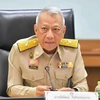Singapore (VNA) - ASEAN member countries and Japan are best-placed to work together to boost cyber resilience given the spectre of rising cyber threats in the region, according to a recent article published by the Singaporean-based ISEAS – Yusof Ishak Institute’s site fulcrum.sg.
The article cited ASEAN member states’ report which shows that they saw a 28% surge in cyberattacks last year. In Japan, there has also been a continued increase in cyber threats, from 150 cases in 2021 to 230 in 2022.
The authors wrote that there have been several key initiatives to drive collaboration between the sides to tackle the scourge of cyber threats, producing practical outcomes.
However, building on a previously published cyber readiness table, an updated analysis that ranks countries based on three key indices (the National Cyber Security Index (NCSI), Global Cybersecurity Index (GCI), and ASEAN Digital Integration Index (ADII)) shows that Malaysia and Singapore are the only countries in the region that can be classified as cyber ready. Intriguingly, Japan’s NCSI score falls into the “developing” category rather than “fully ready” to deal with their own cyber threats, placing it fifth in the NSCI ranking with a score of 63.74 (after Thailand in third place and Indonesia in fourth).
The article suggested that the future of Japan-ASEAN relations can be fortified by not only enhancing technological defence but also by encouraging a collective and inclusive two-way approach to cybersecurity. While Japan can provide skills transfer in some areas, cooperation can extend from a one-sided assistance programme towards a deeper, more collaborative partnership aimed at enhancing collective resilience against cyber threats. ASEAN countries can contribute diverse regional perspectives, experiences, and shared localised threat intelligence with Japan — enriching the overall understanding on cyber threats and response strategies.
It concluded that by emphasising shared responsibilities, reciprocal knowledge exchange, and joint capacity-building efforts, the two sides can go beyond existing initiatives and leverage individual nations’ strengths to create a more robust cybersecurity ecosystem and thus contribute to a more secure and stable Indo-Pacific./.

Japan to coordinate decarbonisation plans with ASEAN, Australia
Japan will coordinate with Southeast Asian countries and Australia on policies that reduce carbon emissions in a region that is particularly reliant on fossil fuels, according to Nikkei Asia.





















